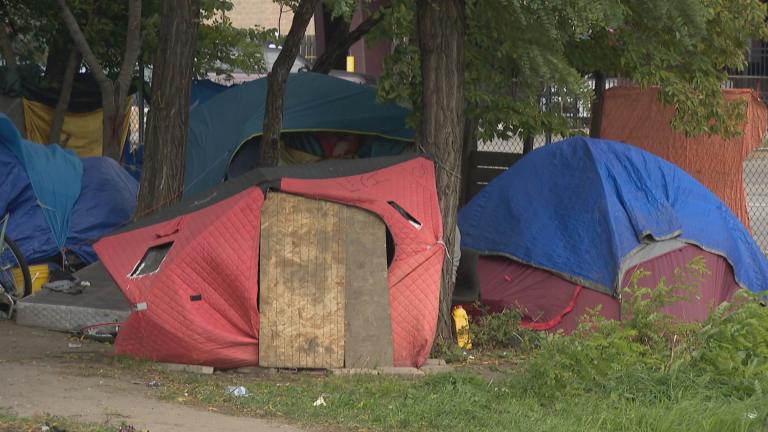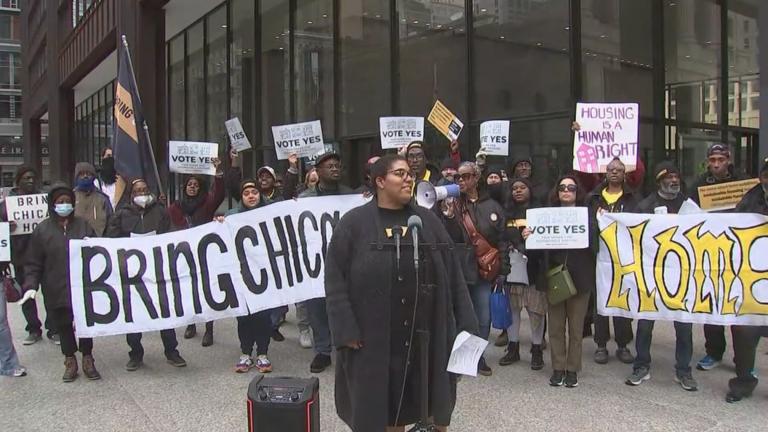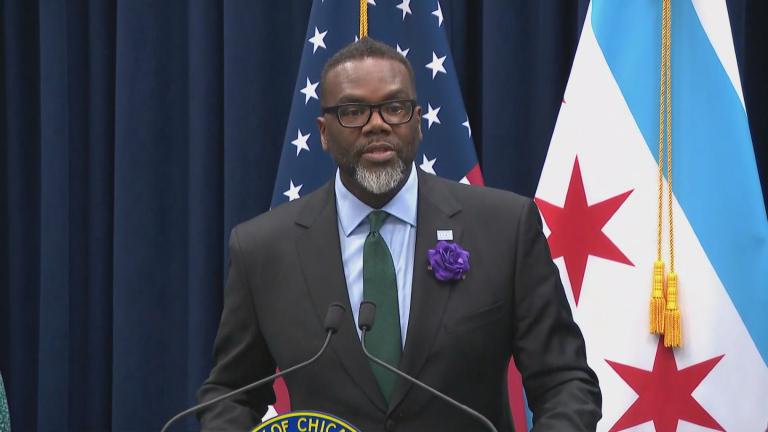This story was produced in partnership with students at the Medill School of Journalism at Northwestern University and WTTW News.
By Paris Fransway, Ellie Callahan Skelly and Shreya Srinivasan
For much of the Chicago area’s homeless population, home is a cot in a room shared with strangers.
Cook County is trying to change that.
The county recently funded the purchase of two hotels that offer longer-term apartment-style living — providing professional support, privacy and stability.
Maurice Butler, 62, has spent about 20 years living on the street. When he was recently diagnosed with terminal kidney and prostate cancer, he said he knew he needed to find a more permanent and private place to stay.
“It makes a great difference in my life,” Butler said. “You know, sleeping on a bus stop, you gotta sleep with one eye open, or a park bench with one eye open and one closed. Here, you can close your eyes and you can let your body rest. You can take a shower. You can feel good about yourself.”
Butler was offered a temporary home at Evanston’s Margarita Inn, 1566 Oak Ave., which is interim housing run by the nonprofit Connections for the Homeless.
“It was the city of Evanston saying we have got to get these vulnerable populations out of these congregate settings and into private rooms or into kind of safer situations,” said Nia Tavoularis, chief development officer for Connections for the Homeless.
WTTW is spending a year focused on the challenging experiences and unique perspectives of unhoused people across Chicago in “FIRSTHAND: Homeless.”
Butler’s time at the Margarita Inn is a complete one-eighty from his previous shelter experiences.
“This place is nothing, nothing like that,” Butler said. “They are not putting you out at 5 o’clock every morning. I mean, 5 o’clock on a Sunday morning — where you going? Ain’t no church open, you can’t go to church at no 5 o’clock in the morning. So you got to walk the streets.”
The Margarita Inn is one of two hotels bought with Cook County funding.
It’s a move Tavoularis said is working.
“It’s showing that it’s much more impactful,” Tavoularis said. “So prior to the pandemic in that congregant setting, about 40% of the folks that we worked with would exit into a stable housing situation. Here at the Margarita, 70% of the folks that have ever come through here exit into a stable housing position.”
The hotels were originally used as temporary solutions during the COVID-19 pandemic. Housing advocates said the hotels are turning out to be significantly more effective than a traditional shelter approach.
“Now families can stay intact, and again, really focus their efforts on, you know, moving again to that next destination,” said Lynda Schueler, CEO of the nonprofit Housing Forward.
Housing Forward runs the Write Inn in Oak Park, the second hotel purchased with county funds.
“We’re providing them with that stable realization that they need,” Schueler said. “There’s the psychological safety of being able to shut your door and have a level of privacy.”
Both former hotels feature semi-private rooms, three meals per day and support services, prioritizing privacy and independence.
Access to those features at the Write Inn helped Janelle McField’s family when her partner lost his job.
“We just want financial stability for our kids and a good environment for them to grow up, and not have to worry about anything basically,” McField said.
With three children and another on the way, McField said being able to have their own space was crucial.
“I’ve heard about shelters, and especially with younger kids, it’s very hard,” McField said. “So here your gonna have a bit of a peace of mind, a bit of a piece of somewhat home.”
Services include on-site medical care, access to a life skills coordinator and access to case workers, helping to lower the barriers to permanent housing.
Latricia Freeman is a life skills coordinator at the Margarita Inn. She said it’s important “for the life skills coordinator first to come in and say, ‘First of all, you’re welcome. You matter. And this does not have to be your end.’”
Cook County used American Rescue Plan funds for both projects.
“Sleeping in church basements is better than being on the street; however, … nobody would choose that if they had other choices,” Cook County Board President Toni Preckwinkle said. “And so we’re trying to be sure that people have more traditional housing, despite the fact that they’re struggling financially.”
Service coordinators from both organizations said they expect this holistic approach to lead to more long-term success.
“You can sleep peacefully, you can have a peace of mind,” Butler said.
Cook County officials said they hope to further extend this approach as they look for hotels in southern suburbs.







